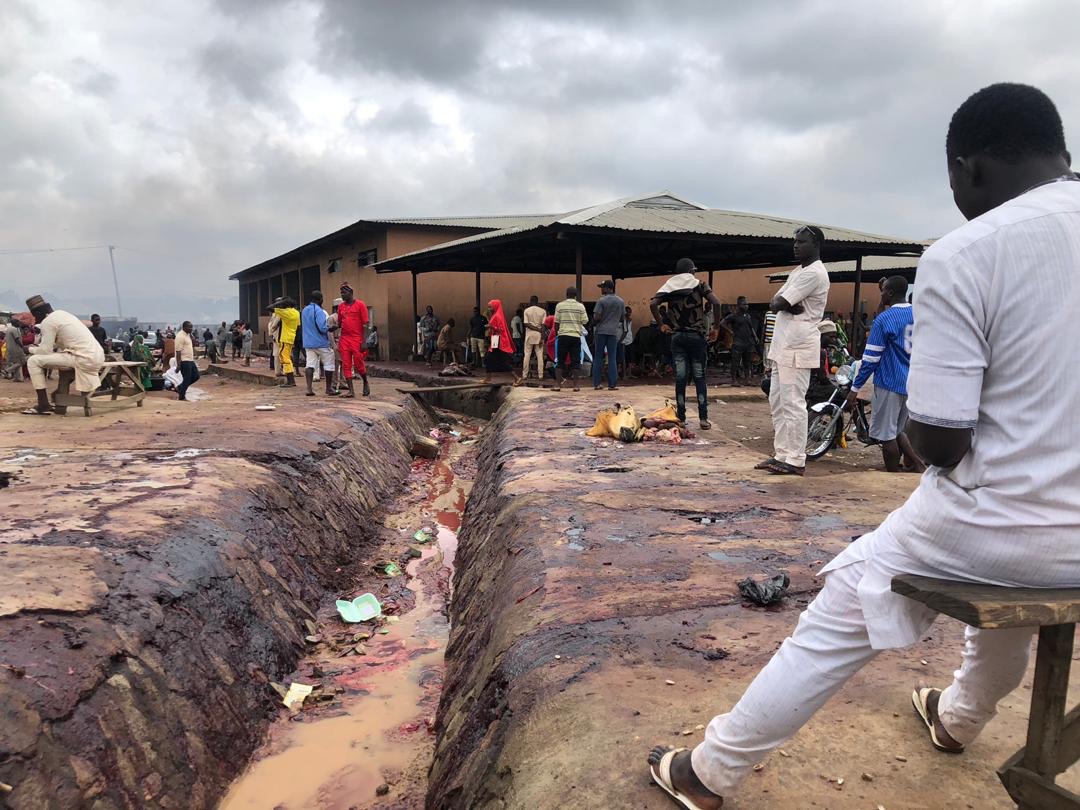One Health in Nigeria
An abbatoir in Nigeria. Credit: Ifeanyi Nosfor
By Ifeanyi M. Nsofor
A Nigeria Health Watch team went undercover in August 2019 to see first-hand, the conditions of abattoirs in Abuja - the federal capital city of Nigeria and Suleja - the most densely populated city in the neighboring Niger. Three abattoirs were surveyed, photographed and operators interviewed.
The abattoirs were filthy with animals slaughtered on bare floors, and dogs feeding on leftovers. Car tires were used to burn furs off slaughtered animals. We wrote extensively about our visits here. It seemed zoonotic diseases were lurking in the nooks and corners of these abattoirs. The conditions were similar in other parts of Nigeria and the risk of disease transmission from animals to humans and vice versa.
Bushmeat from hunted or poached wildlife including bats, rodents, snakes, crocodiles, and antelopes is freely available in Nigeria. Research shows that bushmeat consumption is a threat to biodiversity and increases the risk of infectious disease transmission from animals to humans.
A project on epidemic preparedness in Nigeria (#PreventEpidemicsNaija) lobbies with the government of Nigeria to budget and release more funds for epidemic preparedness to the Nigeria Centre for Disease Control (NCDC). It also seeks to increase public awareness of infectious diseases and their possible outbreaks in Nigeria.
An important component of the 15-month old #PreventEpidemicsNaija advocacy project is One Health. The World Health Organization (WHO) describes “One Health” as an approach to designing and implementing programs, policies, legislation, and research in which multiple sectors communicate and work together to achieve better public health outcomes. Important sectors to consider under the One Health approach include public health, animal health, agriculture, environment, and pharmaceuticals (antimicrobial resistance).
The vision of Nigeria One Health initiative, which is coordinated by the Nigeria Centre for Disease Control (NCDC), is to create a healthy and balanced ecosystem for humans and animals. The plan will be implemented through surveillance and response, training and research, governance and leadership, communication, and resource mobilization. The implementation of this plan would ensure that abattoirs are better managed and linked to the NCDC surveillance system.
To underscore the impact of weakness in One Health implementation, Nigeria is currently responding to the largest Lassa fever outbreak in the country. Data from NCDC shows that as of April 4, 2020, there were 963 confirmed Lassa fever cases and 188 deaths in Nigeria. In comparison, in the same period, there were 276 cases of COVID-19 and 6 deaths.
Lassa fever shows how interactions of animals, the environment, and human behavior cause ill health. Lassa fever is transmitted through contamination of foods and household cooking utensils by urine, stool, saliva, or blood of infected rodents. Further, person-to-person transmission occurs through contact with blood, urine, stool, vomit, and other body fluids of an infected person. Lassa fever and other infections transmitted from animals to humans (zoonoses) have been recurring in Nigeria for decades. It is time to put a stop to these outbreaks.
These are three ways to ensure that Nigeria’s future epidemic preparedness plan within the ambit of One Health.
First, governments at all levels in Nigeria must prioritize budgeting for epidemic preparedness. Civil society organizations advocating for health security must realize that health is on the concurrent list in Nigeria. This means that federal, state, and local councils have responsibilities for healthcare. For instance, the abattoirs previously discussed are under the purview of local councils. The usual focus on the federal government by civil society organizations and the media should be toned down to prevent exigencies.
Second, planning and budgeting must be multisectoral. Indeed, there is a national policy document called the National Action Plan for Health Security (NAPHS) which defines this collaboration. The NAPHS is a comprehensive multi-sectoral costed plan which integrates work plans from different sectors. It includes the establishment of One Health strategic national stockpiling system of medical commodities for use in public health emergencies by 2021 with coordination at federal, state, and local councils. The national One Health platform for outbreak responses should work at the interface of human health, animal health, and the environment.
Third, the private sector must begin to invest in epidemic preparedness in Nigeria. COVID-19 has shown that pandemics do not spare anyone. It has devastated businesses and economies. With hindsight, private businesses would not have minded investing percentages of their profits to prevent the current global shutdown in economic activities. Some ways businesses can support One Health in Nigeria include, investing in standard world-class abattoirs, provision of clean water and sanitation facilities in existing government-run abattoirs, and investing in public toilets. Investment in public toilets in Nigeria is needed because over 46 million Nigerians defecate in the open, according to UNICEF. This is a threat to environmental and public health.
Nobody knows when and where the next pandemic would occur. Currently, a One Health approach is a good way forward to minimize the risk of disease outbreaks.
__________________________________________________________
Dr. Ifeanyi M. Nsofor is Director of Policy and Advocacy at Nigeria Health Watch, Senior New Voices Fellow at the Aspen Institute, and Senior Atlantic Fellow for Healthy Equity at George Washington University.
